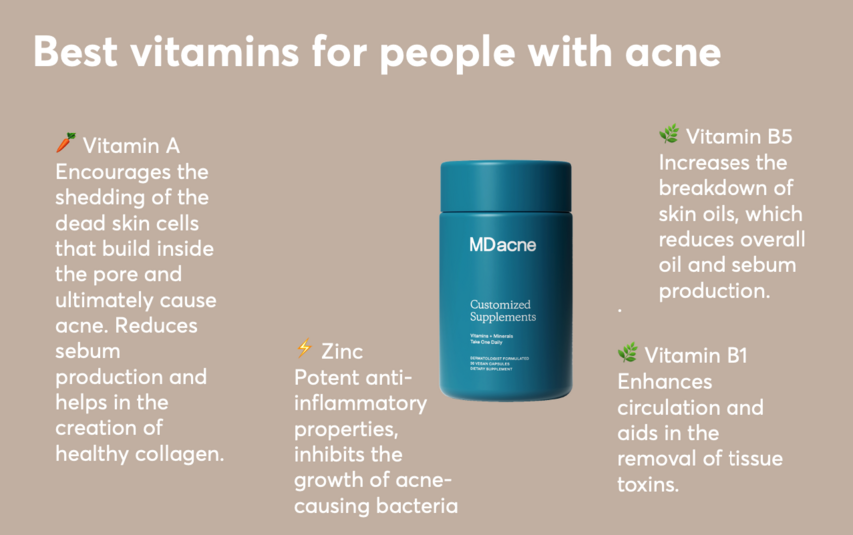Best Vitamin supplements for acne scars
What Causes Acne Scars?
Acne scars can affect individuals of all skin types and tones. They form during the healing process of acne pimples when the skin’s fibroblasts produce either too little or too much collagen. This imbalance can result in different scar types, depending on collagen production levels. Research shows that proper nutrients can enhance wound healing, reduce scars, and even prevent future ones.
Types of Acne Scars
Pink Spots result from dilated skin capillaries and typically fade within 2-3 months once active acne is under control. Brown Spots are flat, dark spots caused by melanin overproduction during the healing process, often resembling sunspots. Real Acne Scars are depressed scars (like "ice-pick," "boxcar," or "rolling" scars) that occur when collagen production is insufficient, causing the skin to heal poorly.
How to Prevent Acne Scars
- Treat Acne Early: Preventing breakouts is the most effective way to reduce scarring.
- Personalized treatments with over-the-counter products are often effective and affordable.
- Avoid Popping Pimples: This can worsen inflammation and increase the risk of scars.
- Use Sunscreen and Hydrate: Sunscreen protects against hyperpigmentation, while moisturizers with niacinamide support the skin barrier and healing.
- Adopt a Nutrient-Rich Diet: Vitamins A, B, and zinc are critical in improving skin healing.
The Unique Role of Vitamin A and Vitamin B5 in Skin Healing and Scar Prevention
Vitamin A is crucial in skin cell regeneration, and collagen production is vital for repairing damaged skin and preventing acne scars. It helps speed up wound healing by stimulating the formation of new blood vessels and promoting the production of fibroblasts, the cells responsible for generating collagen and elastin. Additionally, topical retinoids derived from vitamin A improve skin texture, fade dark spots, and prevent further breakouts by regulating sebum production.
High doses of Vitamin B5 (pantothenic acid) have been found to support skin barrier function and accelerate the healing process. This vitamin aids in reducing inflammation, increasing hydration, and promoting faster tissue repair, all of which minimize the risk of scarring. Pantothenic acid is also involved in coenzyme A production, a compound essential for lipid metabolism, which helps balance oil production in acne-prone skin. Studies suggest that adequate levels of vitamin B5 can reduce the severity of breakouts and improve the overall healing process, reducing the likelihood of developing permanent scars.
The Best Supplements for Acne and Acne Scars For individuals dealing with acne and acne scars, supplements that target inflammation, collagen production, and skin barrier repair can be beneficial. The MDacne Skin Clearing Vitamins and Minerals supplement is specifically designed for acne-prone skin, containing a blend of essential nutrients to support skin healing and reduce breakouts.

Top Five Ingredients in MDacne’s Supplement and Their Benefits:
- Pantothenic Acid (Vitamin B5): Aids in reducing oil production, improving skin hydration, and speeding up the healing of active acne lesions.
- Vitamin A: Supports skin cell turnover, promotes collagen production, and enhances wound healing, reducing the appearance of scars.
- Zinc: Helps reduce inflammation, regulates sebum production, and accelerates wound healing, making it essential for preventing acne breakouts and scarring.
- Selenium: Acts as an antioxidant to protect skin cells from oxidative stress and supports immune function to minimize breakouts.
- Vitamin C: Plays a critical role in collagen synthesis, helping to repair damaged skin and lighten post-inflammatory hyperpigmentation (PIH).
By incorporating these essential nutrients, individuals with acne-prone skin can improve their skin's overall health, reduce inflammation, and minimize scarring.
Best vitamin supplements for people with active acne
Best supplements for adult and hormonal acne
More info on acne scarring
Shop
Skin Clearing Vitamins & Minerals
Peptide Scar Cream
References
1. Stadelmann, W.K.; Digenis, A.G.; Tobin, G.R. Impediments to wound healing. Am. J. Surg. 1998, 176, 39S–47S.
2. Reichrath, J.; Lehmann, B.; Carlberg, C.; Varani, J.; Zouboulis, C.C. Vitamins as hormones. Horm. Metab. Res.2007, 39, 71–84.
3. Wicke, C.; Halliday, B.; Allen, D.; Roche, N.S.; Scheuenstuhl, H.; Spencer, M.M.; Roberts, A.B.; Hunt, T.K.Effects of steroids and retinoids on wound healing. Arch. Surg. 2000, 135, 1265–1270.
The importance of patients' nutritional status in wound healing. Br. J. Nurs. 4. Russell, L. 2001, 10, S42–S49.
5. Harris, C.L.; Fraser, C. Malnutrition in the institutionalized elderly: The effects on wound healing. Ostomy. Wound Manag. 2004, 50, 54–63.
6. Shepherd, A.A. Nutrition for optimum wound healing. Nurs. Stand. 2003, 18, 55–58.
7. Mazzotta, M.Y. Nutrition and wound healing. J. Am. Podiatr. Med. Assoc. 1994, 84, 456–462.
8. Trujillo, E.B. Effects of nutritional status on wound healing. J. Vasc. Nurs. 1993, 11, 12–18.
More info on pantothenic acid for people with acne.
To find the right supplements for your unique skin, take the free skin assessment by clicking here.




